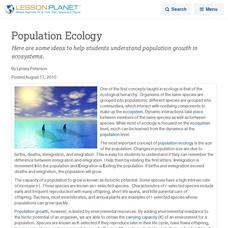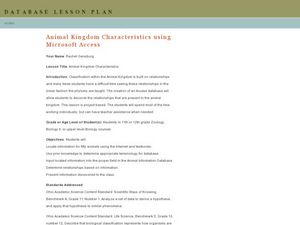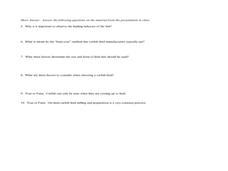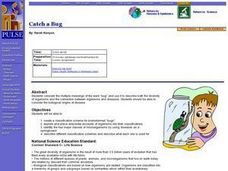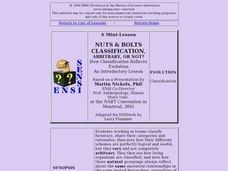Curated OER
What Should You Know about Classification?
Many learners have a tough time picking out pertinent information from a text or in class. Sometimes, all it takes is a study/reading guide to show them the way. The activity here focuses on taxonomy and classification, including...
Curated OER
Ecosystems: A Home By Any Other Name
Students can learn more about the parts of ecosystems through exploration and hands on activities.
Curated OER
Population Ecology
Here are some ideas to help students understand population growth in ecosystems.
Curated OER
The Important Role of Biomes
Travel the world from the comfort of your classroom with this unit on the Earth's biomes.
Curated OER
Animal Behavior
For this animal behavior worksheet, students will review various types of animal behavior including those that are instinctual and those that are learned. This worksheet has 10 true or false and 8 matching questions.
Curated OER
Atoms and Elements: An Introduction
Students are able to discuss the difference between a proton, a neutron and an electron. They also can explain the difference between an ionic and a covalent bond. Students know the main structure of atoms and molecules. Student are able...
NOAA
Plankton
Dive into the world of plankton. The 17th installment of a 23-part NOAA Enrichment in Marine sciences and Oceanography (NEMO) program introduces different types of plankton. Young scientists then use what they have learned to classify...
Virginia Department of Education
Predator-Prey Simulation
Do your pupils have the misconception that environmental predators are "bad" and harm smaller creatures? The simulation explains, in detail, the important role predators play in maintaining a stable ecosystem. Through web-based research,...
Chicago Botanic Garden
Impacts of Climate on Forest Succession
Part two in a series of four explores the effects of climate on succession or the changing of plant species in a forest. Groups review how to identify trees and then spend a day in the field collecting extensive data on trees to...
AAAS
Identification and Classification of Grassland Plants
Take learning outside and start classifying grasslands. Young ecologists observe grassland plants in order to classify them into the appropriate species by family. They note their characteristics and where they grow. A true field...
Curated OER
Cellular Models
Each student construct a model of a cell on a large cookie, including the parts which were discussed during lecture.? Half of the class will be instructed to make plant cell models and the other half will be in charge of animal cell...
Curated OER
Animal Kingdom Characteristics using Microsoft Access
Students create a computer database to discover relationships present in the Animal Kingdom. In this classification lesson, students enter data into a Microsoft Access database. They answer questions on a worksheet and create a visual...
Curated OER
What's in a Name?
Students study the binomial system of naming organisms. They are given a name of an organism and they must draw a picture of what they think the organism looks like. Then they research the organism, find what it really looks like, and...
Curated OER
What's In A Name?
Students explore the concept of the binomial system of nomenclature for classifying organisms. Students travel on a field trip to observe organisms displayed and their common names. Students complete several classroom activities and...
Curated OER
Boosting Your Memory
For this memory worksheet, students learn about three different ways to memorize given information. They make up phrases to help remember lists and they create mental maps to remember terms. They put what they learned to the test and...
Curated OER
Aquaculture Science
Students research the different careers in aquaculture. In this aquaculture lesson students complete activities that include a PowerPoint presentation.
Curated OER
Species Diversity and Phylogeny
Students explore the classification system of organisms: taxonomy. They examine prepared slides of Protozoans and record information on a Taxonomy Recording Sheet. Two additional classifying activities are also included in this lesson...
Alabama Learning Exchange
Botany Scavenger Hunt Where's the Ginkgo?
Learners use a science journal to log plants that are native to Alabama. In this plant lesson plan, students identify characteristics, describe environments, and classify the plants that they find.
Curated OER
Food Chains Are Not A Necklace!
Second graders examine how food chains interact with different plants and animals. They practice using new vocabulary. They also discover the role of pesticides in the environment.
Curated OER
Arsenic and Human Health
Ninth graders concentrate on arsenic poisoning as an example of the connections among health, geography, and geology as they develop a persuasive presentation about the dangers of arsenic in the drinking water, targeting a specific...
Curated OER
What's In A Name?
Pupils create a binomial system of nomenclature for classifying organisms they encounter in a field trip to a natural history museum or from pictures in library books. They work in small groups to create accurate drawings and place the...
Curated OER
Nuts & Bolts: is Classification, Arbitrary, Or Not?
Students, in groups, classify furniture, share their categories and rationales, then note how their different schemes vary, perfectly logical and useful, but completely arbitrary.




